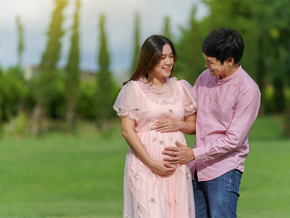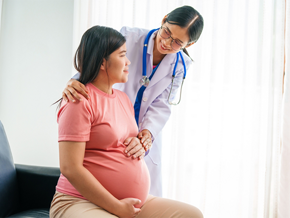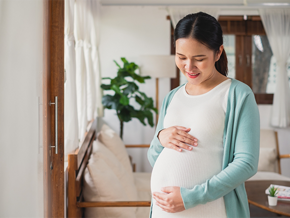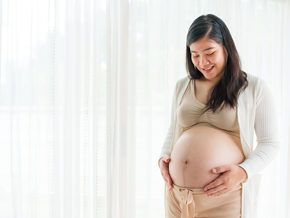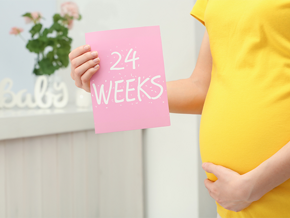
At 26 weeks pregnant, you might notice that you're more tired and a bit clumsy as your growing bump affects your balance. This guide explains why your body feels different and highlights your baby's development, like opening their eyes for the first time.
Your Baby’s Development at 26 Weeks
According to the American Pregnancy Association, your baby measures about 34 cm (13.38 in) from head to heel and weighs 0.9 kg (about 2 lbs.). That’s roughly the size of a large zucchini or a cucumber.
Sensory and physical highlights
The American College of Obstetricians and Gynecologists notes that your baby can react to loud sounds between Week 25 and Week 28.
Their eyelids are also beginning to open and close, and they can now perceive light through their abdomen. A study in Developmental Science found that babies at 26 weeks of gestation already prefer looking at simple, face-like patterns of light.
Brain and lung development
At this stage, your baby’s brain is developing the connections it will need to produce brainwaves in the coming weeks. Their lungs continue to produce surfactant, which helps the air sacs inflate after birth, preparing them for their first breath outside the womb.
Your baby’s position
At 26 weeks pregnant, the baby’s position still changes often since they still have plenty of room to move. They’ll start to settle into a head-down position sometime around Week 32 and Week 36.
Typical Symptoms at 26 Weeks Pregnant

Elevating your feet for 15 to 20 minutes several times a day can help reduce swelling during the second and third trimesters.
Are you seeing new changes in your body? Here are just a few symptoms that you can expect.
Growing belly and body aches
At this stage, your belly size becomes more pronounced as your uterus expands and shifts your center of gravity. Your growing bump puts extra pressure on your back and hips, which can lead to aches and discomfort.
A 2022 review in the journal Medicina found that musculoskeletal pain is one of the most common issues during pregnancy. Your skin may also feel itchy as it stretches over your abdomen, hips, and breasts.
If you also feel your abdomen tighten at times, don't worry! These are likely Braxton Hicks contractions, which are your body’s way of practicing for labor.
Swelling in your hands and feet
Are your shoes feeling snug? Swollen feet at 26 weeks pregnant are typical due to fluid retention. However, if you experience sudden or severe swelling, especially in your face or hands, contact your doctor right away, as it could be a sign of preeclampsia.
Leg cramps and deep vein thrombosis
The American Academy of Family Physicians notes that painful leg cramps, especially at night, are a common symptom during the second trimester. This can be due to the pressure your growing baby puts on the nerves and blood vessels that go to your legs. Try to sleep on your side to improve circulation.
Call your doctor immediately if you feel sharp pain and swelling in one leg that doesn’t go away. This could be a sign of a serious blood clot known as deep vein thrombosis (DVT).
Your Guide to Nutrition and Wellness
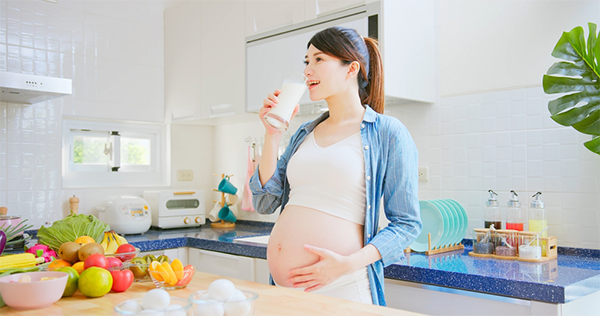
At 26 weeks, your baby needs calcium for their growing bones, so drink your milk daily!
At 26 weeks pregnant, foods to eat should be rich in nutrients, like iron (to prevent anemia), calcium (for bones and teeth), protein (for tissue growth), and omega-3 fatty acids (for brain development).
Drink plenty of water throughout the day to help with swelling, constipation, and Braxton Hicks contractions.
Don’t Ignore These Symptoms
Recognizing the signs of pregnancy complications is vital. Contact your healthcare provider immediately if you experience:
- Vaginal bleeding or leaking fluid
- Severe abdominal pain or persistent cramps
- A significant decrease in your baby's movement
- An intense headache, vision changes, or sudden swelling that could be signs of preeclampsia
Frequently Asked Questions
Is it safe to have sex at 26 weeks pregnant?
Having sex when pregnant at 26 weeks is safe for low-risk pregnancies. Your baby is well-protected by the amniotic fluid and the strong muscles of your uterus. Consult your doctor if you have any concerns.
Is the baby fully developed at 26 weeks?
No, not yet. At 26 weeks, your baby has formed all their essential organs, but these still need to develop fully. Doctors consider a baby ready for birth when they reach full-term, which is between 39 weeks and 40 weeks and six days of pregnancy.
Over the next few months, your little one will focus on maturing their lungs for breathing, building brain connections, and strengthening their immune system. Your baby will also gain the fat they need to stay warm and thrive outside the womb.
What should I expect if I'm pregnant with twins?
If you're 26 weeks pregnant with twins, you can expect more pronounced symptoms, a larger belly, and more frequent check-ups. Your nutritional and energy needs are also higher. According to ACOG, you’ll need 600 extra calories a day if you’re carrying twins (900 calories if you're carrying triplets). Your doctor may also recommend more iron and folic acid.
Now that you know what to expect when you’re 26 weeks pregnant, you can support your baby’s growth, manage your pregnancy symptoms, and look forward to your third trimester.
Head on over to the ParentTeam Moms and Dads Facebook group and share your experiences about being 26 weeks pregnant!
References
Ackerman, Sandra. "The Development and Shaping of the Brain." In Discovering the Brain. Washington, DC: National Academies Press (US), 1992. Accessed August 6, 2025. https://www.ncbi.nlm.nih.gov/books/NBK234146/.
Centers for Disease Control and Prevention (CDC). "Signs and Symptoms of Urgent Maternal Warning Signs." Last modified May 15, 2024. Accessed August 6, 2025. https://www.cdc.gov/hearher/maternal-warning-signs/index.html.
Cleveland Clinic. "Fetal Development: Stages of Growth." Last reviewed March 19, 2024. Accessed August 6, 2025. https://my.clevelandclinic.org/health/articles/7247-fetal-development-stages-of-growth.
Khawar, Hira, and Kriti Marwaha. "Surfactant." In StatPearls. Treasure Island, FL: StatPearls Publishing, 2025. Last updated June 12, 2023. Accessed August 6, 2025. https://www.ncbi.nlm.nih.gov/books/NBK546600/.
Mayo Clinic. "2nd Trimester Pregnancy: What to Expect." February 7, 2025. Accessed August 6, 2025. https://www.mayoclinic.org/healthy-lifestyle/pregnancy-week-by-week/in-depth/pregnancy/art-20047732.
National Health Service (NHS). "Newborn Respiratory Distress Syndrome." nhs.uk. Last reviewed March 29, 2021. Accessed August 6, 2025. https://www.nhs.uk/conditions/neonatal-respiratory-distress-syndrome/.
pregnancybirth&baby. "Itching During Pregnancy." Last reviewed March 2025. Accessed August 6, 2025. https://www.pregnancybirthbaby.org.au/itching-during-pregnancy.
raisingchildren.net.au. "26 Weeks Pregnant." Last modified September 17, 2024. Accessed August 6, 2025. https://raisingchildren.net.au/pregnancy/week-by-week/second-trimester/26-weeks.















